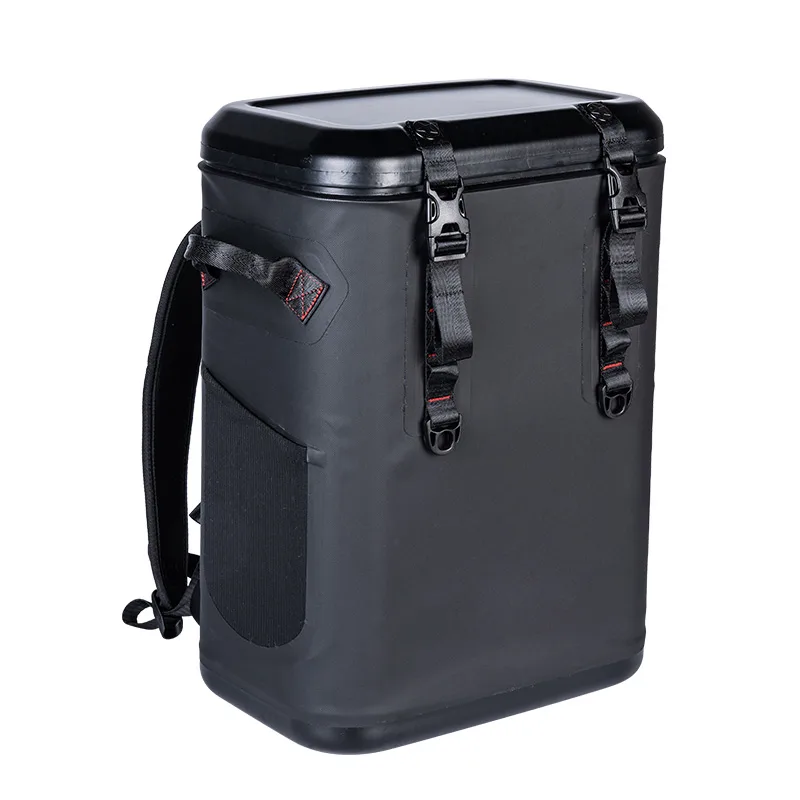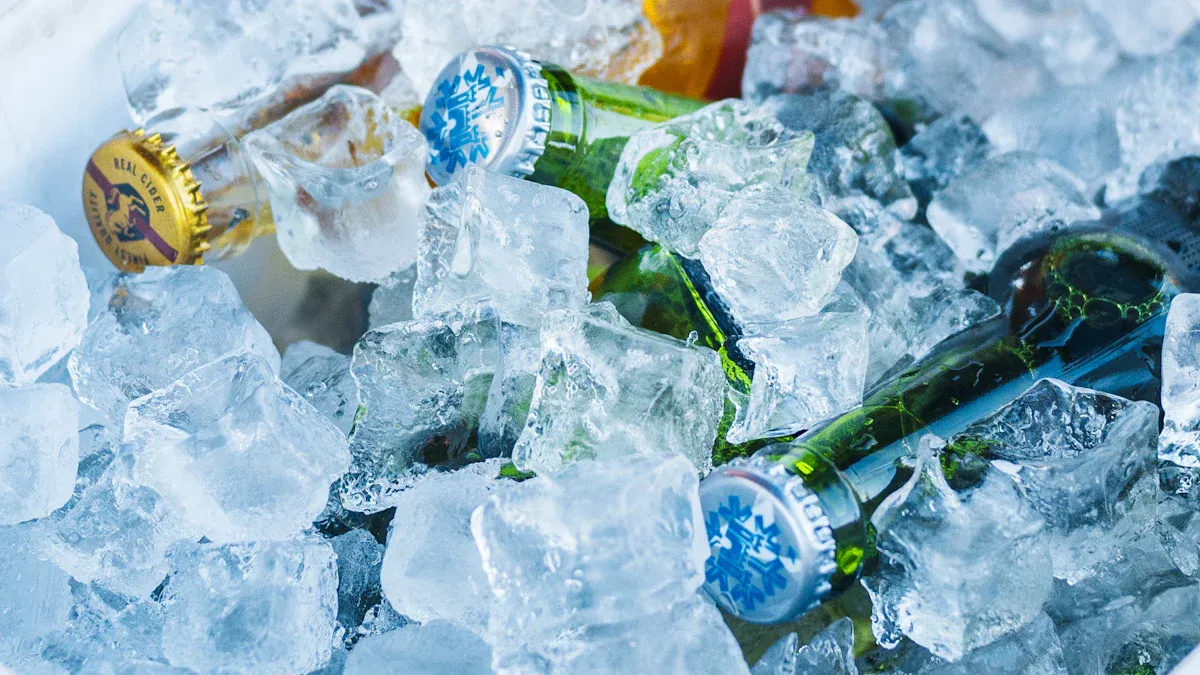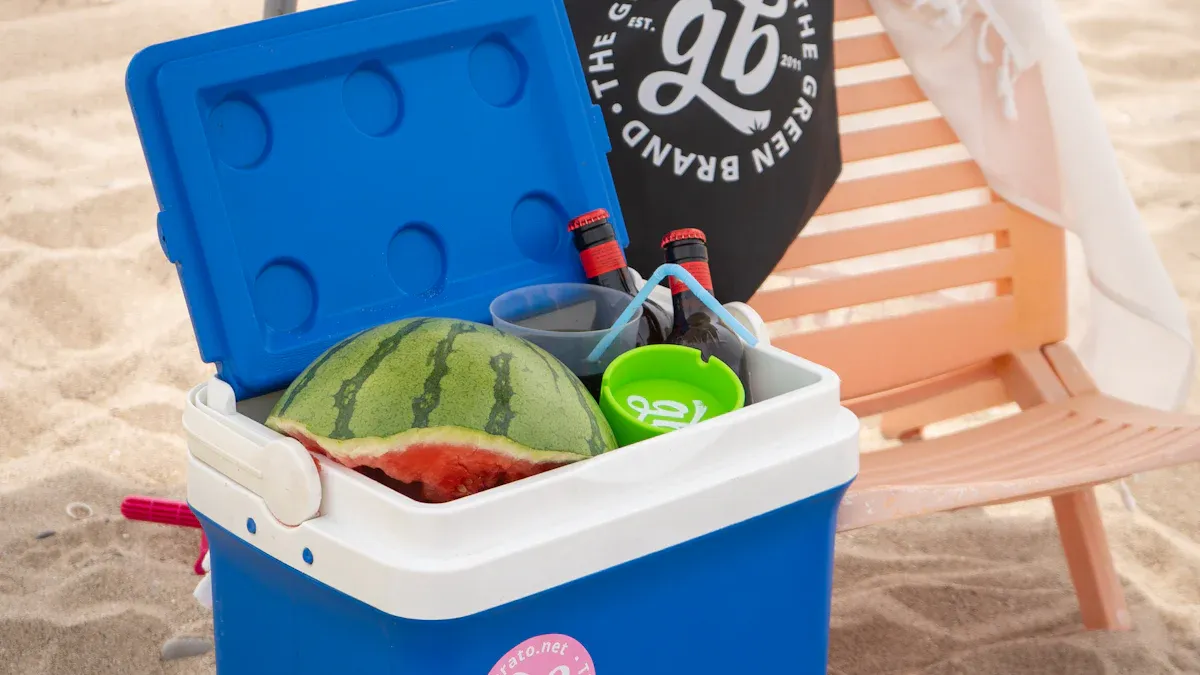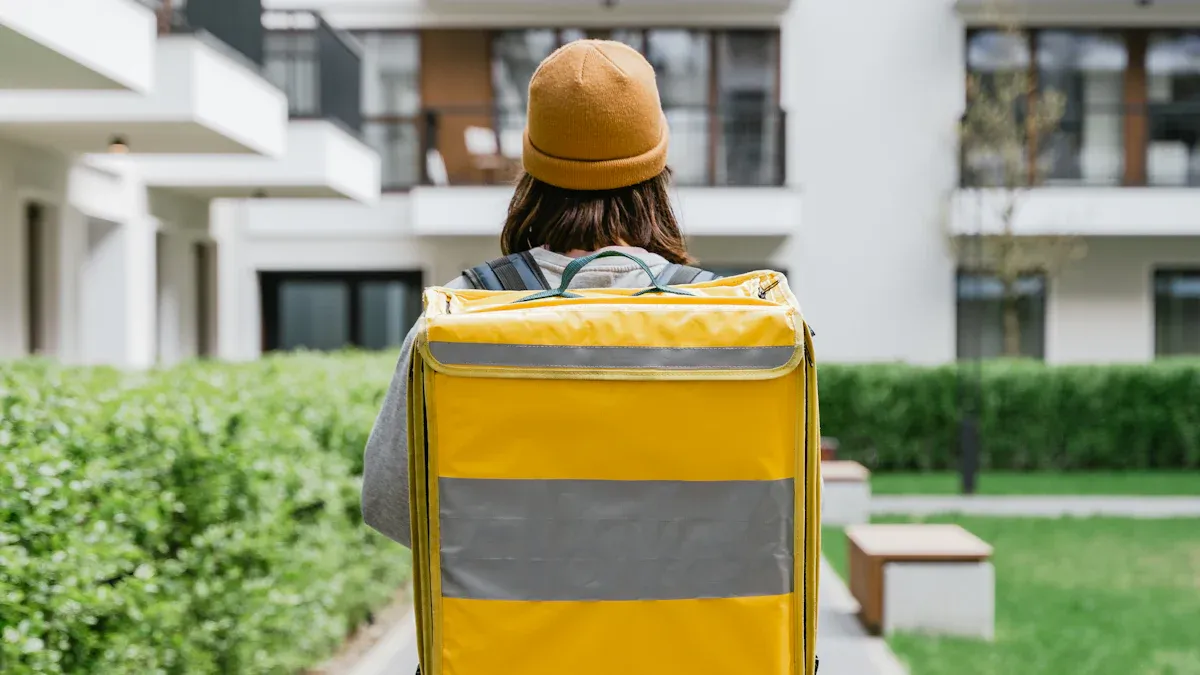
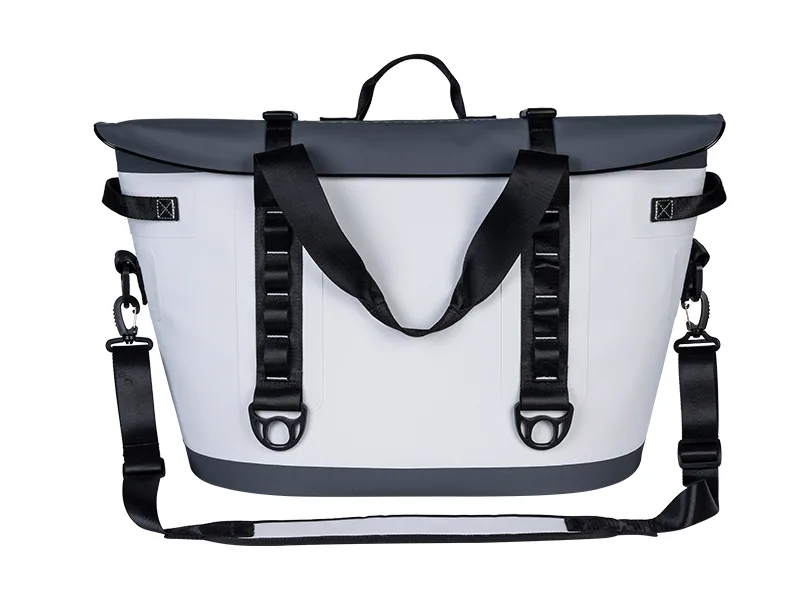
If you want to make the best choice in insulated cooler totes factory partners, you need to look for proven quality, advanced technology, and strong R&D. The global coolers and insulated bags market reached around USD 2.5 billion in 2023 and continues to grow, driven by demand for reliable temperature control and durable materials. Choosing a trusted insulated cooler bag factory protects your investment, as top manufacturers use certified materials, offer robust insulation, and guarantee product performance. KUER stands out with comprehensive manufacturing, patent-backed innovation, and a global footprint, ensuring you receive insulated cooler bags that meet the highest standards for quality and value.
KUER one of the leading cooler box manufacturers, our design ensure your plastic ice cooler performs at its best. If you wonder how does a cooler box work, the answer lies in the science of insulation and smart engineering.
Top Insulated Cooler Bag Factory Rankings
KUER Group Overview
When you look for a top insulated cooler bag factory, KUER Group stands out as a leader in the industry. KUER Group operates five factories and two trading companies, covering every step from raw material production to finished product delivery. You benefit from their advanced manufacturing equipment, including 22 automatic rotomolding machines, blow molding, and foaming equipment. This setup allows KUER to produce up to 1,500 cooler boxes daily, ensuring fast lead times and reliable supply for your business.
KUER Group’s cooler bag review scores high in every category. Their R&D team has applied for over 50 patents, showing a strong commitment to innovation. You can choose from a wide range of products, such as soft cooler bags, backpack coolers, hard coolers, rotomould cooler boxes, injection coolers, blow-molded coolers, and ice buckets. KUER offers extensive customization options, including size, color, logo printing, handle types, and sustainable materials. As a custom cooler bag manufacturer, they support both ODM and OEM projects, making it easy for you to create unique products for your brand.
Quality assurance is a top priority at KUER. The company holds ISO 9001, BSCI, and GRS certifications, which guarantee strict quality control and sustainable practices. Their cooler bag review highlights excellent insulation performance, with thick walls and premium materials that keep ice frozen for days. KUER’s global supply network and experienced sales team ensure smooth communication and on-time delivery, no matter where you are located.
Tip: If you need a reliable insulated cooler bag factory with strong R&D, high production capacity, and advanced customization, KUER Group should be your first choice.
Malaysia-Based Manufacturers
Malaysia has become a key hub for insulated cooler bag factory operations in Southeast Asia. Many manufacturers here have over 15 years of experience and offer large-scale production, often exceeding 200,000 units per month. When you read a cooler bag review for Malaysian factories, you often see praise for their use of quality materials like 420D polyester and aluminum bubble insulation. These factories provide a wide range of customization options, including branding, logos, and special designs for different markets.
You can expect fast response times, usually within four hours, and strict quality assurance measures such as ISO certifications and regular QA/QC inspections. Malaysian manufacturers comply with international packaging regulations, including FDA and EU standards. Their strategic location supports efficient logistics and global exports, making them a strong choice if you need a custom cooler bag manufacturer with proven export capabilities.
Eco-Friendly Factory Leaders
If sustainability is your priority, you should consider eco-friendly insulated cooler bag factory leaders like Headwind Group. This company integrates renewable materials such as bioplastics from corn and sugarcane, plant-based insulation like coconut husks, and recycled PET bottles for fabric. Their cooler bag review often highlights the use of organic cotton, jute, and canvas, which are biodegradable and have a low carbon footprint.
You can trust their commitment to sustainability, as they follow strict metrics:
- Carbon and water footprint tracking
- Energy consumption monitoring
- Chemical toxicity index
- High recyclability and biodegradability rates
Headwind Group holds certifications such as GOTS, OEKO-TEX Standard 100, Global Recycled Standard (GRS), and Bluesign®. They also provide material traceability reports and third-party audits, ensuring transparency and compliance. Their manufacturing and sourcing teams operate across Asia, offering turnkey solutions for eco-conscious brands. When you read a cooler bag review focused on sustainability, Headwind Group consistently ranks among the top.
Customization Specialists
Customization is a major trend in the cooler bag review landscape. Leading custom cooler bag manufacturers like Sanne Cooler use advanced technology, including automated machinery and specialized software, to create unique designs quickly and efficiently. You can request a wide range of custom features:
- Logo and artwork printing (screen printing, heat transfer, embroidery)
- Material choices (polyester, nylon, PVC, eco-friendly fabrics)
- Size and shape variations
- Handle and strap options (webbing, padded, reinforced, adjustable)
- Color and branding customization
- Insulation and lining upgrades (foam, reflective aluminum)
- Extra features (pockets, zippers, reinforcements)
Sanne Cooler’s process ensures durability and fast turnaround times. Their cooler bag review scores high for flexibility and quality, making them a top choice if you want to stand out in the market with a custom cooler bag manufacturer.
Global Exporters
When you need an insulated cooler bag factory with a strong global reach, you have several top options. DeliverKingdom in Guangzhou, China, operates a 12,000-square-meter facility with over 400 skilled workers. They serve clients worldwide, including restaurants and food delivery platforms. Other global leaders include YETI Holdings, Igloo Products Corp., Coleman Company, Thermos, and Patagonia. These companies hold significant market shares and maintain extensive distribution networks.
| Company/Region | Evidence of Global Export Reach and Distribution Network |
|---|---|
| YETI Holdings | Holds 5-10% market share; strong R&D and extensive global distribution networks. |
| Igloo Products Corp. | Holds 5-10% market share; strong global distribution networks. |
| Coleman Company | Holds 5-10% market share; strong global distribution networks. |
| Thermos | Holds 5-10% market share; strong global distribution networks. |
| Patagonia | Holds 5-10% market share; strong global distribution networks. |
| China (Asia Pacific) | Major manufacturing hub with strong export infrastructure; produces large quantities at low cost; growing market revenue and CAGR; supports worldwide distribution. |
You can see the export strength of these manufacturers in the chart below:
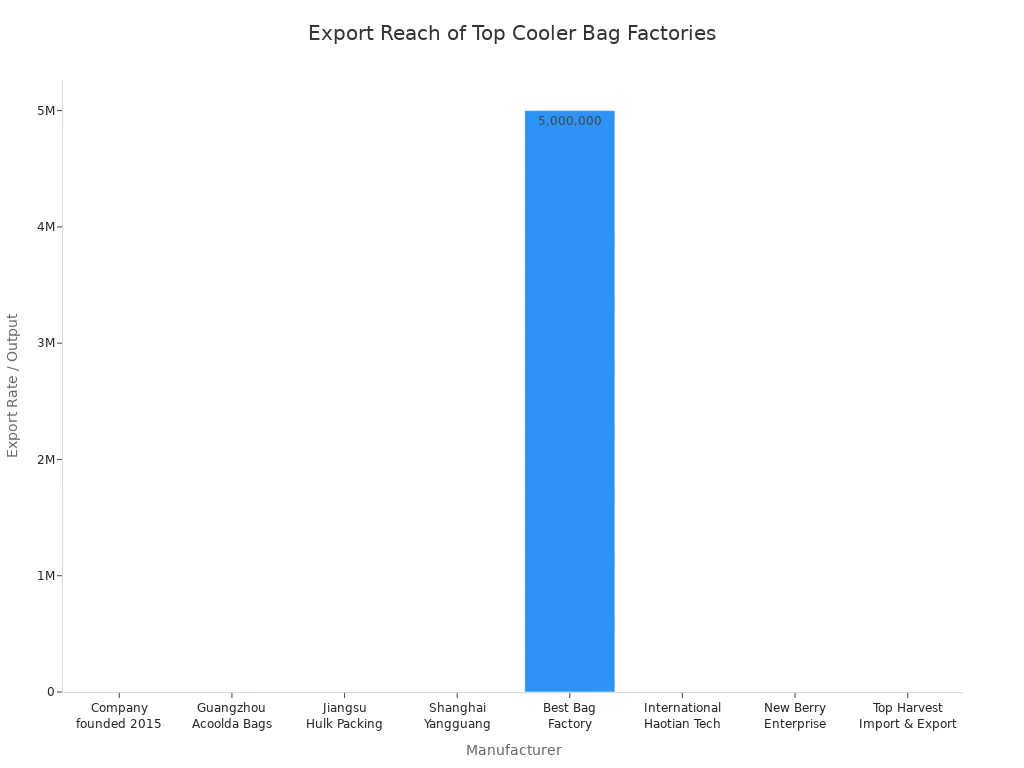
Many of these companies hold international certifications such as BSCI, ISO9001, and GRS. They offer high production capacities, fast lead times, and reliable quality control. When you read a cooler bag review for these exporters, you will find consistent praise for their ability to meet large orders and deliver worldwide.
Note: Choosing a global exporter ensures you have access to a wide product range, international certifications, and proven logistics for timely delivery.
Evaluation Criteria
Insulation Performance
When you evaluate an insulated cooler bag factory, insulation performance stands as a top priority. Leading manufacturers use premium materials like PU foam or gel packs, paired with leak-proof fabrics, to deliver strong insulating power. This combination keeps stuff cold for long periods, even in hot conditions. For example, TLP Packaging uses multi-layer insulation and double-zipper closures to boost ice retention and temperature control. You should look for factories with certifications such as ISO 9001:2015, BSCI, and GRS, which confirm high performance and food safety standards.
| Feature | Aldi Cooler Bag | Trader Joe’s Cooler Bag | Other Budget Options |
|---|---|---|---|
| Insulation Thickness | Thicker than many pricier competitors | Not specified | Basic “space blanket” liners |
| Insulation Layers | Multi-layer system with strong inner plastic and thinner outer shell | Single layer implied | Single basic liners |
| Closure Design | Double-zipper for better sealing and temperature retention | Single zipper closure | Basic closures |
| Performance | Keeps frozen items frozen even in hot car rides; comparable to some hard coolers | Adequate for short trips, less effective over time | Minimal insulation effectiveness |
| User Experience | Positive, with recommendations to pre-cool with ice packs | Functional but less insulating | Poor insulation |
Durability and Materials
You want cooler bags that last. Factories achieve durability by using high-denier polyester or nylon, PU or PVC coatings, and reinforced handles. Construction methods like heat-welded or RF-welded seams prevent leaks and extend product life. Many top bags feature ripstop weaves, DWR treatments, and PEVA liners for extra protection. Reinforced zipper areas and hybrid designs with hard shells add to the durable construction. These features ensure your cooler bag maintains quality and withstands frequent use.
| Material Type | Properties | Contribution to Durability |
|---|---|---|
| High-denier Polyester (600–1200D) | UV-stable, abrasion resistant, holds color | Abrasion resistance, UV stability |
| High-denier Nylon (1000–1680D) | Stronger, more abrasion resistant | Superior abrasion resistance |
| PU/PVC Coating | Water repellent or waterproof | Moisture protection, added strength |
Pricing and Minimum Orders
Price plays a major role in your decision. Leading factories offer flexible minimum order quantities (MOQs), starting as low as 6 units and scaling up to 250 units for larger projects. This flexibility helps you manage costs and inventory. Lead times range from 5 to 12 days, depending on order size and customization. The table below shows typical MOQs for different bag types and materials:
| Bag Type / Material | Minimum Order Quantity (MOQ) |
|---|---|
| Polyester/Ripstop (36 Cans Plus MEGA Cooler) | 50 |
| Nylon (2 in 1 Beach Bag Cooler) | 50 |
| Non-Woven (12-Pack Cooler Plus Collapsible Cube) | 50 |
| Non-Woven/Insulated (Deluxe 6 Pack Insulated Cooler) | 100 |
| Polyester/Insulated (Accent 18 Cans Cooler Backpack) | 50 |
| Polyester (6 Pack Lunch Cooler) | 100 |
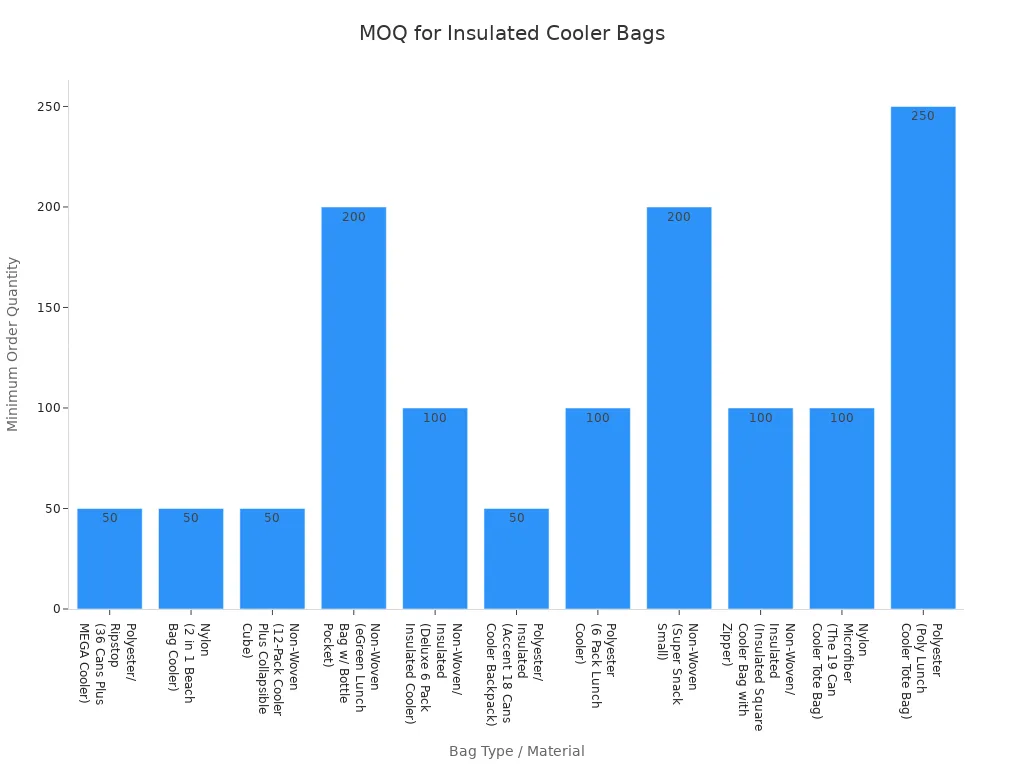
Tip: Factories with competitive price structures and low MOQs help you grow your business without high upfront costs.
Design and Customization
Customization sets your brand apart. Top factories offer a wide range of options, including size, color, logo printing, and special features like extra pockets or reinforced straps. Hard coolers allow for larger imprint areas and co-branding, while insulated cooler bags focus on front and strap customization. You can request custom printing, embroidery, and even unique shapes to match your brand’s style. This flexibility ensures your cooler bag meets both functional and marketing needs.
| Feature | Hard Coolers (YETI, Coleman, RTIC, KOOZIE) | Insulated Cooler Bags |
|---|---|---|
| Size | Larger, hold more items | Smaller, easier to carry |
| Customization Areas | Front, side, top | Front, carrying strap |
| Branding Options | Co-branding, large imprint area | Custom printing on front and strap |
Sustainability and Eco-Friendly Practices
Sustainability matters more than ever. Many factories now use eco-friendly materials like bamboo fibers, recycled plastics, and biodegradable linings. These choices reduce plastic waste and support long-lasting quality. Factories also focus on reusable designs, efficient production, and compliance with BSCI and ISO9001 standards. You benefit from products that align with your brand’s environmental values and deliver durability for repeated use.
- Use of recycled and biodegradable materials
- Production of reusable cooler bags
- Emphasis on quality and durability to reduce waste
- Compliance with global standards for ethical manufacturing
Note: Choosing a factory with strong sustainability practices helps you meet market demand for eco-friendly products and supports your brand reputation.
Insulated Cooler Bag Factory Comparison
Product Quality
When you compare insulated cooler bag factories, you notice significant differences in product quality. A detailed cooler bag review often highlights how brands like Aldi invest in thicker, multi-layer insulation and double-zipper closures. These features keep your items colder for longer periods. Aldi’s cooler bags also include padded adjustable straps, bungee cord storage, and durable stitching. They use eco-friendly TPU fabric and conduct regular inspections to maintain high quality. In contrast, a cooler bag review of Trader Joe’s bags shows simpler insulation and fewer features, making them suitable for short trips but less effective for extended use. The table below summarizes these differences:
| Quality Aspect | Aldi Cooler Bag Features | Trader Joe’s Cooler Bag Features |
|---|---|---|
| Insulation | Multi-layer, strong seal, long-lasting cold | Simpler, short-term use |
| Construction | Padded straps, bungee storage, detailed inspections | Basic handles, fewer features |
| Materials | Advanced, eco-friendly TPU | Standard materials |
| Quality Control | Regular testing, strong supplier relationships | Less rigorous |
| Price/Value | $9.99, high-quality features | $7.99, basic design |
A cooler bag review that focuses on quality will always point out these construction and material differences.
Features and Options
You have many choices when you look at features and options in a cooler bag review. Manufacturers offer a wide range of cooler types, including insulated shopping bags, boat tote coolers, golf bag coolers, and heavy-duty hard coolers for camping. You can select from double-walled, vacuum, or standard insulation. Materials range from polyester and nylon to eco-friendly TPU and recycled fabrics. Customization options include multi-color imprinting, full branding, and various sizes. Many cooler bag review articles mention water resistance, zipper closures, and fast production turnaround as key features.
- Custom coolers combine function and brand visibility, giving you long-term use.
- Many bags use sustainable or recyclable materials, supporting eco-friendly branding.
- You can choose from compact lunch coolers to extra-large rolling coolers.
- Hard-shell options offer durability, while soft-sided bags provide flexibility and style.
- Unique uses include team-building kits, event giveaways, and charity campaigns.
A cooler bag review will often highlight how these features set one manufacturer apart from another.
Value and Suitability
You want value and suitability that match your needs. A cooler bag review of TLP Packaging shows their bags retain temperature for 4 to 8 hours and use a three-layer design for thermal efficiency. These bags work well for food delivery, grocery retailers, corporate gifts, and outdoor events. They are lightweight, foldable, and customizable, making them ideal for bulk orders and branding. TLP Packaging uses sustainable materials like RPET and holds certifications such as ISO 9001:2015 and BSCI, which appeals to eco-conscious buyers.
Premium brands like YETI target outdoor enthusiasts with high-performance coolers that keep ice for up to 36 hours. Coleman and Igloo offer reliable, affordable options for families and casual users. Some brands now use recycled materials and introduce wearable sling coolers or rolling designs for added convenience. A cooler bag review will show that premium brands serve high-end markets, while mid-tier and emerging brands focus on cost-effective, functional designs. You can find a cooler bag that fits your budget, branding goals, and sustainability values.
Tip: Always check a cooler bag review to see how a product’s value and suitability align with your specific needs.
Manufacturing Excellence
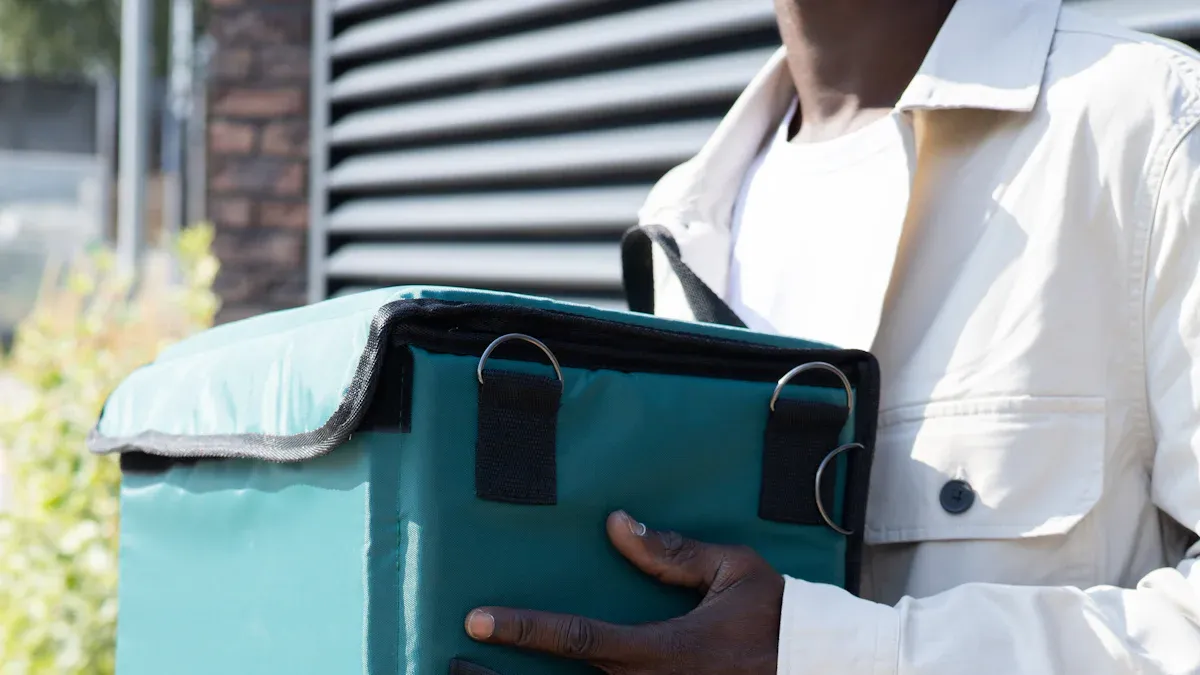
Production Technology
You benefit from advanced production technology when you choose a top insulated cooler bag factory. Leading manufacturers use high-frequency welding to create leak-proof seams that keep your cooler bag strong and reliable. Hydraulic and laser cutting machines ensure every piece of material fits perfectly, which improves both durability and insulation. Factories select premium materials like PVC for toughness and TPU for flexibility and stain resistance. They use waterproof zippers with double-layer seals and interlocking teeth to prevent leaks and maintain temperature. Many factories also implement Lean manufacturing principles. This approach helps reduce waste, optimize efficiency, and shorten lead times. You get a product that performs well and supports your business goals.
- High-frequency welding for durable seams
- Hydraulic and laser cutting for precision
- Premium materials: PVC, TPU, and wear-resistant nylon
- Waterproof, heat-resistant zippers
- Layered insulation with air-filled, reflective, and foam layers
- Lean manufacturing to boost efficiency and lower environmental impact
Quality Control
You want assurance that every cooler bag meets strict standards. Top factories focus on quality at every stage. They test materials for insulation, durability, and food safety. Temperature retention tests confirm that your cooler bag keeps items cold for hours. Leak and strength tests ensure the bag can handle heavy loads without failing. Before shipping, quality control teams inspect each bag individually. This process identifies and resolves any issues, so you receive consistent, high-quality products. Reputable manufacturers comply with international standards, giving you confidence in both safety and performance.
- Material testing for insulation and durability
- Temperature retention checks
- Leak and load strength tests
- Final inspection of every batch
You can trust that your cooler bags will meet global quality and safety requirements.
Innovation and Patents
Innovation drives the insulated cooler bag industry forward. Companies like PackIt and YETI lead with patented technologies. PackIt’s ECOFREEZE® Technology integrates freezable gel into cooler walls, keeping contents cold for hours without ice. Their coolers feature leakproof welded liners and antimicrobial protection. YETI holds patents for models like Roadie® and Tundra®, focusing on durability, insulation, and user-friendly features. Leftcoast Innovations patented a flexible, waterproof insulated bag with a re-closeable seal and transparent window for easy viewing.
| Company | Patent Highlights | Innovation Focus |
|---|---|---|
| PackIt | Freezable gel in walls, leakproof liners, antimicrobial protection | Cooling without ice, easy cleaning |
| YETI | Patented cooler designs, insulation technology, wheeled coolers | Durability, insulation, usability |
| Leftcoast Innovations | Flexible waterproof bags, re-closeable seals, transparent windows | Product visibility, flexible design |
You gain access to the latest features and technology when you partner with innovative manufacturers.
Buyer Recommendations
For Large Orders
When you plan to place a large order, you need to focus on features that guarantee performance and reliability. Consider these key factors:
- Select cooler bags with insulated linings to keep items cold and fresh.
- Make sure the bags are leakproof and waterproof to prevent spills and maintain hygiene.
- Choose durable, easy-to-clean materials for long-term use.
- Pick the right size based on how much you need to carry, but keep portability in mind.
- Look for adjustable straps and comfortable handles for easy transport.
- Check that zippers are strong and moisture-resistant to protect the contents.
You should also think about your target market’s needs and how the bags will be used. Offer a range of sizes to meet different customer demands. Plan for future growth by considering new designs and features, such as wheels or ultra-light materials.
Tip: Reliable factories like KUER can handle high-volume orders and offer flexible options for expanding your product line.
For Custom Branding
Custom-branded cooler bags help your brand stand out at events, trade shows, and in daily use. You can choose from many decoration methods, such as imprinting, engraving, or monogramming. These bags work well as corporate gifts, rewards, or giveaways.
| Step | Best Practice |
|---|---|
| Demand Communication | Share your brand goals, event themes, and functional needs with the factory. |
| Design Plan Confirmation | Review multiple design options for appearance, color, and logo placement. |
| Material Procurement | Select high-quality, eco-friendly materials that meet international standards. |
| Cutting and Sewing | Skilled teams use advanced equipment to ensure precise logo application and strong seams. |
| Branding Methods | Choose the right decoration method and confirm production lead times. |
| Marketing Use | Use branded cooler bags to boost brand image and drive sales growth. |
Note: Factories with rush production options can help you meet tight deadlines for special events.
For Eco-Conscious Buyers
If you value sustainability, you should look for factories that use recycled or biodegradable materials and eco-friendly production processes. High-quality, thick insulation and water-resistant fabrics ensure the bags last longer and reduce waste. Customization options let you showcase your commitment to the environment with unique colors and logos.
You can check the manufacturer’s reputation by reading customer reviews and case studies. Consistent quality control ensures every bag meets your standards. Compare costs and payment terms to find the best value without sacrificing quality. Always request samples before placing a large order to test durability and insulation.
Choosing a factory with strong environmental practices helps your brand appeal to eco-conscious customers and supports a greener future.
For Small Businesses
Small businesses need flexibility and value. Look for factories that offer low minimum order quantities and a variety of sizes. This approach helps you manage inventory and cash flow. Durable, easy-to-clean materials keep your products looking good and lasting longer.
You can use custom branding to build your business identity, even with smaller orders. Many factories provide design support and fast turnaround times, so you can respond quickly to market trends. Reliable delivery and clear communication are essential for small business success.
Tip: Start with a small batch to test the market, then scale up as your business grows.
You have many strong options when choosing an insulated cooler bag factory. KUER leads with advanced technology, global reach, and proven innovation. Other top manufacturers, like Pingyang iCom Bag Co., Ltd and SAPPHIRE PACKAGING CO., Ltd, offer unique strengths in cost control and quality.
| Manufacturer | Focus Area | Key Strengths |
|---|---|---|
| KUER Group | Innovation, Global Supply | High R&D, large capacity, patents |
| Pingyang iCom Bag Co., Ltd | Cost, Quality | In-house production, cost control |
| SAPPHIRE PACKAGING CO., Ltd | Standardization | Modern machinery, export expertise |
Choose KUER for bulk or custom needs, SAPPHIRE for standardized quality, or Pingyang for affordability. Assess your goals, then contact these factories for samples or quotes to find the best fit for your business.
FAQ
What certifications should you look for in an insulated cooler bag factory?
You should check for ISO 9001, BSCI, and GRS certifications. These prove the factory meets international standards for quality, safety, and sustainability. Certified factories follow strict guidelines and deliver reliable products.
How can you customize insulated cooler bags for your brand?
You can choose size, color, logo printing, and special features. Factories offer options like embroidery, screen printing, and unique shapes. Customization helps your brand stand out at events or in stores.
What eco-friendly materials do top factories use?
| Material | Benefit |
|---|---|
| Recycled PET | Reduces plastic waste |
| Organic Cotton | Biodegradable |
| Plant-Based Foam | Renewable resource |
You support the environment by choosing bags made from these materials.
How do you place a bulk order with a factory?
Contact the sales team with your requirements. Review samples, confirm pricing, and agree on delivery terms. Most factories require a deposit before production starts.
Tip: Always request a sample before placing a large order to check quality and features.
See Also
Understanding The Common Page Not Found Error Message

